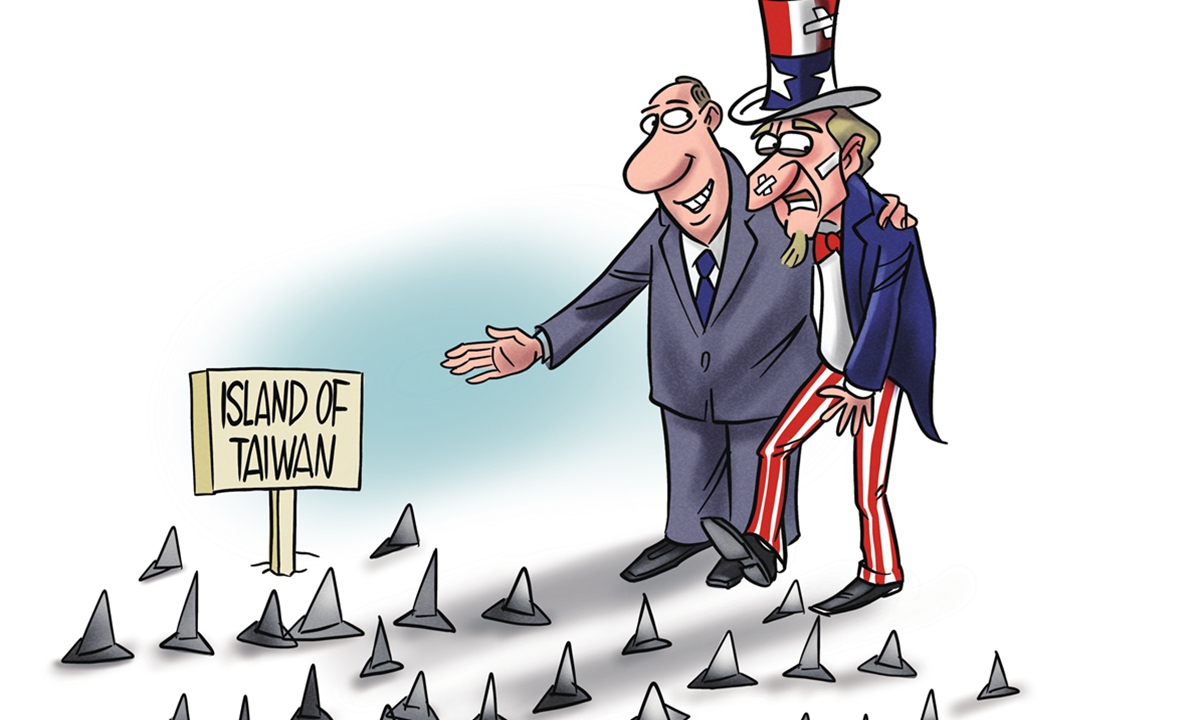
Illustration: Liu Rui/GT
Despite opposition from the US military and a lack of public support from the White House, Nancy Pelosi, the Speaker of the House of Representative, kicked off her Asia-Pacific trip on Monday though without a mention of a stop in the island of Taiwan.If Taiwan is eventually included in Pelosi's itinerary, the main motivation for her visit will still come from within the US. The dangerous adventurist forces represented by people including former secretary of state Mike Pompeo have the reason and motivation to incite Pelosi's visit to the island, which, if realized, will amplify Pelosi's influence among the political and military adventurists at home. It's apparent that the US military-industrial complex is an important part of these forces, so are the personnel from government security intelligence and defense system, who in turn infiltrate US congressional institutions.
Since the media broke the news of Pelosi's possible visit to the island of Taiwan, there has been an uproar in Chinese and American public opinion. China has already conducted live-fire training in waters near Pingtan, southeast China's Fujian Province, and more may be held in the future. The psychological and public opinion warfare between China and the US are undoubtedly supported by the strength of both countries. In general, time is on the side of China. Giving China one more day means more pressure on the US political and military adventurist forces and a higher cost for them to pay for taking risks on the Taiwan question, Lü Xiang, a research fellow at the Chinese Academy of Social Sciences, told the Global Times.
Some Democratic lawmakers also expressed support for Pelosi's visit to Taiwan, indicating that there is a hard-line hostile atmosphere in the US Congress on China policy and that the Congress is trying to kidnap the planning and implementation of Taiwan-related issues in the White House, which is not only harmful to China-US relations, but also toxic and unhealthy for US own interests.
These adventurist forces developed against the backdrop of an anti-China and anti-Russia political base in the US, with the vast majority of members of Congress, politicians, the military and civil society hyping the so-called threat of China and Russia. These political and military adventurists want to use the name of "people" to promote a populist society in which it will be easier to stir up trouble toward China and Russia. What they are afraid is that without taking actions against China right now, there won't be more chances to do so in the future.
As a result, we are seeing a paranoid and hostile attitude toward China on all sides in the US, including Congress, the government, the military, as well as some far-right extremists and arms dealers. The US media also have been hyping the so-called "China threat" relentlessly without no exception, said Song Zhongping, a Chinese military expert and TV commentator. "In response to China-related issues, there is actually a relatively broad consensus among those adventurists to initiate challenging adventurous behavior in advance to contain China's development."
This mentality stems from America's strong anxiety that China will develop and replace it. If the US cannot correctly view China's development, fails to recognize that China's development is unstoppable, then friction and conflict will inevitably occur between the two countries. The US is supposed to understand where China's core interests lie and where China's national security red line is, but unfortunately, it has kept trampling upon the red line to provoke China, causing troubles and escalating risks, noted Song. The Taiwan question in fact is only one of many issues in China-US competition. But the US has taken it as the main leverage to test China. It aims to contain China in a comprehensive manner also by challenging China over other issues concerning the country's core interests including Hong Kong, South China Sea, Xinjiang and Xizang.
Such "adventurism" can be seen in a wide range of fields, including not only political and military spheres, but also in soft power areas such technology and culture. The all-round competition between China and the US is mainly reflected in the scientific and technological field. The US has imposed restrictions and launched crackdown on China in science, technology, engineering and mathematics (STEM) fields and refused to cooperate with China in high-tech areas including artificial intelligence, aerospace, semiconductor chips and so on. The main reason is that the US worries that China may surpass it one day.
China has been emphasizing the need to manage differences between China and the US in order to avoid vicious strategic competition. China has always welcomed healthy competition, especially in the high-tech field. We do not exclude competition in the military field either, but such competition must conform to the development goals of a community with a shared future for mankind, and must also contribute to the progress of science and technology as well as civilization. Once there is vicious competition, and if ideology is used to stage a life-or-death struggle, then there will be risks of conflict between China and the US, Song pointed out.
The author is a reporter with the Global Times. opinion@globaltimes.com.cn
